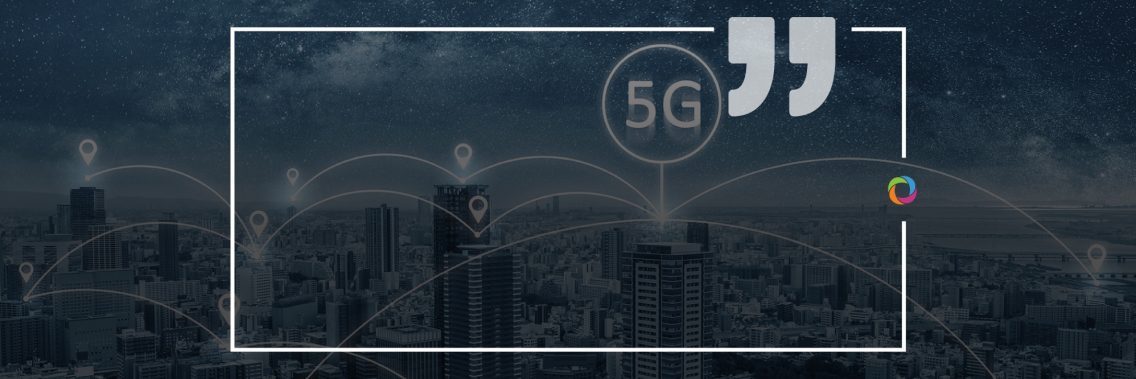5G wireless technology has been widely recognized as a potentially transformative development in many sectors. One area where the ultra-fast technology will play a decisive role is the 2030 Agenda for Sustainable Development. We have asked the opinions of several experts regarding which of the 17 SDGs could be most impacted by 5G.
What is the role of 5G in international development?

“5G will enable new capabilities in the everyday lives of citizens (smart devices, smart cities) as well as several sectors of economic activity (transportation, agriculture, manufacturing industry, health industry etc.) by facilitating high-speed communications, highly interactive transactions, mobile/wireless access to diverse endpoints commissioned in large volumes. Deploying the 5G infrastructure (core, edge, end devices) by itself is considered a significant growth factor in economies worldwide. Furthermore, new business opportunities in the different industries and cross border cases, such as 5G cross-border corridors for connected and automated driving, will boost economic activity and cross-sector collaborations.”

“According to the tech experts, the economic impact of the global mobile ecosystem this year is estimated at more than $1 trillion. Additional indirect benefits and productivity gains enable the mobile industry to contribute nearly $4 trillion to the global economy (equivalent to 5% of global GDP). Mobile operators generate over 60% of the economic benefits of this entire industry. The remaining 40% is produced by other market players: infrastructure manufacturers and integrators, retailers and distributors of mobile products and services, manufacturers of mobile devices, as well as providers of mobile content, applications and services. By 2025, 5G technologies will be used by 5 billion mobile Internet users and 6 billion mobile subscribers. This is the segment of the global ICT industry that is most interested in the stable and conflict-free development of 5G technologies.”

“As an international community and as professionals in international development, we need to understand the scope of 5G. In itself it does not solve anything, it has to be conceived as an ecosystem where we need network providers, regulators, device suppliers, operators and other participants. With this in mind we need to prepare to adopt the possibilities this technology brings because this is wide and needs to be embraced with responsibility by the professional and epistemic community. 5G, when we can deploy it in the future, will provide an edge for our community like no other: mostly with regard to communications and sharing capabilities. It will allow us to perform actions considered to be difficult and slow nowadays, and it will provide us with tools with tracing capabilities and security that provides new options to give communities and economies the capacity of fast and trusted access to information, transactions and sharing. The main impact, in my opinion, will be in medical services and prophylactic care and also in banking services and P2P transactions.”

“5G is becoming the initiator and propelling force for the SDG (Sustainable Development Goals) and it will have a decisive role in progress towards accomplishing the 2030 Agenda for Sustainable Development. It will certainly speed up the advancement in all 17 SDGs with significant contributions in healthcare and education as well as in emission-intensive industries such as energy, manufacturing and transportation. 5G, combined with other new technologies (AI, Machine Learning, Big data, VR, etc.), will transform those sectors by providing significantly higher speed and lower latency among the people, devices and applications, thus improving the systems and procedures in different sectors and enabling innovative technology applications and solutions.”

“5G technology is intended to create a digital ecosystem in which billions of different devices interact with each other in real time together with enhanced speed and reliability of connection. Also, it will enable mobile edge computing (MEC) throughout the infrastructure. Combined with virtual and augmented reality, artificial intelligence and robotics, 5G is promising to be an unprecedented enabler of innovation in industry and services, primarily in areas such as transportation, energy, emergency response and in pandemic situations like COVID-19. It will yield fully automated production facilities, remote surgery and the use of self-driving cars and drones. In doing so, it will enable ‘Smart and Intelligent Management’ of the urban economy.”

“5G is not a single technology but a constellation of technologies that offers the flexibility and enablement of a wide variety of uses that can transform our societies in a seminal way and some may imagine 5G is central to the fourth industrial revolution. Technically speaking, there are two less understood features of this technology. One is referred to as massive MIMO which is an ability to connect to millions of devices in a dense region enabling a wide variety of uses from smart factories to agriculture where continuous monitoring at a granular scale is a must to boost productivity and efficiency. Second is low latency, this is the amount of time it takes for the communication to complete a round trip from the server to the edge device. This maybe the key aspect enabling self-driving cars in the developed world but in the developing world it may be critical in enabling healthcare delivery to regions where there is a lack of medical experts. Hence, from an international development perspective from advance factories (read linked sustainable development) to remote healthcare to precision-based agriculture, all require 5G as the key building block. Hence, 5G becomes the missing piece of the jigsaw puzzle which can bring sustainable international development.”
Which of the 17 SDGs could be most impacted by 5G and the resulting digitalization and why?

“In developing regions, ‘good health and well-being’ (SDG 3) and ‘quality education’ (SDG 4) are likely to be impacted the most by 5G as remote access to health diagnosis/treatment and real-time class participation are enabled by 5G technologies. On a global scale, the ‘affordable and clean energy’ (SDG 7) can be significantly impacted by 5G as technologies such as smart grids will ensure energy distribution and consumption efficiency. The ‘decent work and economic growth’ (SDG 8) is another candidate for significant impact due to the thousands of new jobs expected in the 5G and supplying industries but also due to remote working and remote job operations made seamless on top of 5G networks.”

“Reduced inequalities (SDG 10). Half of the world’s population already has access to the internet and the other 50% will be connected by broadband. And the 5.9 billion mobile broadband subscriptions worldwide today will surpass 8 billion by 2024. This will enable social and economic inclusion and help meet societal needs in education, health, e-government and entrepreneurship.” (SDG 9)

“5G, if affordable, will catalyse international development and the attainment of SDGs. Arguably, its most transformative effect will be on the attainment of quality education and lifelong learning (SDG 4). The interlinked nature of SDGs necessarily means that attaining SDG 4 will positively affect other SDGs. The rate at which technology has enabled the world to deal with the COVID-19 pandemic with a vaccine now on the horizon illustrates how this would also promote good health (SDG 3). Increased skills and education would support decent work and economic growth (SDG 8) and enhance industry and innovation (SDG 9) leading to an acceleration of the reduction of inequalities (SDG 10). We also know that skills would reinforce innovative clean energy solutions (SDG 7) leading to greater climate action (SDG 13) and inevitably promoting SDGs 14 and 15 that deal with life below land and life on water. It would be hard to imagine a case where all this would not foster peace (SDG 16). Probably most importantly, 5G has the potential to embed a fact-based culture through partnerships (SDG 17) – essential at a time when the world is grappling with populism and the multilateral system.”

“5G and its powerful connectivity could seriously improve the way we learn, the way we use banking services and the way machines communicate with other machines. The results of these changes could affect, in a very positive way, education, medical services and financial access, allowing societies to improve the quality of standards at every level. But it mostly affects the areas with needs because this applied technology could improve the capabilities of people with no access impacting directly upon SDGs 3, 4, 7, 8 and 10. Obviously, there are others but I think we have to think practically, and in these SDGs we could be more successful.”

“The five key functional drivers of 5G are: 1) enhanced mobile broadband; 2) ultra-reliable low latency communication); 3) security; 4) massive machine-type communications; and 5) power efficiency. Here are a few of the 17 UN SDGs which may be most impacted by 5G and the resulting digitalization: Decent Work and Economic Growth (SGD8) – a 10% increase in mobile broadband adoption means a 0.8% increase in a nation’s gross domestic product, according to research conducted by Ericsson with London’s Imperial College; Industry, Innovation and Infrastructure, and Reduced Inequalities (SGD 9, SDG 10) – 5G will help to meet societal needs in education, health, e-government and entrepreneurship; Responsible Consumption and Production (SDG 12) – 5G technology will enable factories to be more flexible, productive, safer, energy efficient and cost-effective; Climate Action – the digitalization of a range of services and industries aided by 5G can help to reduce greenhouse and gas emissions. (SDG13) ”
Check more than 190 job opportunities in Information & Communication Technology and Telecommunications here.

